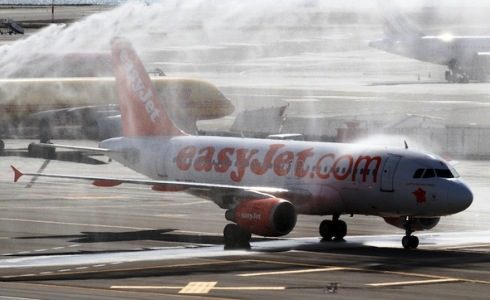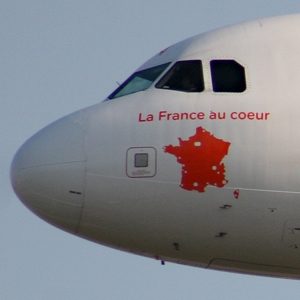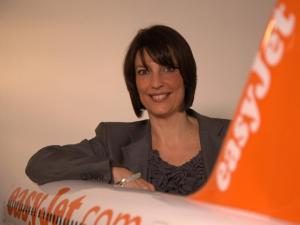Last week UK carrier easyJet formally opened two new bases in the South of France, part of its business strategy to further expand its presence in the French domestic and international markets. The new bases at Nice Cote D'Azur International Airport, the airline’s first destination in France, and Toulouse Blagnac Airport adds to its existing operations at Lyon St Exupéry and the Parisian airports Charles de Gaulle and Orly and increases its French based fleet to 24 aircraft, over ten per cent of its available network capacity.
The airline has stationed a single Airbus A319 at each airport launching flights from Toulouse to Basel, Brussels, Nice, Porto and Venice from March 26, 2012 and from Nice to Barcelona, Bordeaux, Lille, Nantes, Naples and Venice from March 30, 2012. Its Toulouse operation now encompasses 145 flights across 16 routes, while Nice has 430 flights per week on 23 routes. Approximately 1.4 million and 2.4 million passengers were carried from/to the French cities in 2011, respectively.

France is a key market for easyJet, according to Chief Executive Officer, Carolyn McCall, especially due to the low penetration of low-cost carriers in the country. Speaking to The HUB en route to the formal base opening in Nice at the end of last month McCall confirmed that there is just a 24 per cent low-cost penetration in France, versus a 40 to 44 per cent average across Europe, providing “room for development”. The French market differs from many other of the airline’s operations across Europe and the carrier has worked hard in the 16 years since it made its debut in the country to position itself not as a no-frills operator but as a quality alternative to Air France.
“It is not all about price in France, but people want good service and a schedule that supports their requirements,” acknowledged, McCall. “We have worked to get the right positioning. In Spain you can get away with selling on price as it is a low-cost market, but in France you have to be different. Our strategy appears to be working as we now have 91 per cent brand awareness in the country.”
easyJet carried over 12 million passengers on its network of over 170 destinations from France in 2011, up 19 per cent on the previous year. Around one in five of all easyJet passengers now touch one of its 16 network points in France, a figure that has doubled in the past five years. The budget carrier first launched flights into France in August 1996 when it introduced a direct link from its London Luton base to Nice. The following year flights were added to the French city from Amsterdam and Liverpool and soon Nice became a key target city in its European network.
It was another eight years before easyJet expanded to other French cities with links to Paris (both Charles de Gaulle and Orly airports) coming on line in 2002, including its first domestic route between Nice and Paris in June 2002. A base was opened at Paris Orly in 2002 with subsequent bases opening at Paris Charles de Gaulle and Lyon St Exupéry in 2008.
“We are making a significant investment of around €100 million in our new bases which will further strengthen easyJet’s position in both Toulouse and Nice. It also serves to demonstrate our long-term commitment to France, creates solid foundations for future expansion and will help us realise our ambitions of becoming Europe’s preferred short-haul airline,” added McCall.
|
EASYJET’S SCHEDULED AIR SERVICES FROM FRANCE (non-stop weekly departures) |
||||||
|
Year |
French International Market (One Way) |
French Domestic Market |
||||
|
Flights |
Seats |
% Capacity |
Flights |
Seats |
% Capacity |
|
|
1996 |
244 |
36,356 |
0.1 % |
- |
- |
- |
|
1997 |
881 |
130,388 |
0.4 % |
- |
- |
- |
|
1998 |
1,618 |
239,464 |
0.6 % |
- |
- |
- |
|
1999 |
1,872 |
277,056 |
0.6 % |
- |
- |
- |
|
2000 |
2,945 |
435,860 |
0.9 % |
- |
- |
- |
|
2001 |
3,289 |
487,186 |
1.0 % |
- |
- |
- |
|
2002 |
6,244 |
897,715 |
1.9 % |
1,573 |
234,377 |
0.7 % |
|
2003 |
8,854 |
1,316,618 |
2.6 % |
5,812 |
865,866 |
2.6 % |
|
2004 |
11,542 |
1,731,100 |
3.2 % |
9,700 |
1,446,952 |
4.4 % |
|
2005 |
12,613 |
1,921,808 |
3.5 % |
8,183 |
1,270,297 |
3.9 % |
|
2006 |
13,894 |
2,128,118 |
3.7 % |
7,544 |
1,176,864 |
3.6 % |
|
2007 |
17,454 |
2,689,805 |
4.3 % |
7,490 |
1,168,440 |
3.6 % |
|
2008 |
22,765 |
3,529,162 |
5.5 % |
10,448 |
1,629,888 |
5.0 % |
|
2009 |
24,542 |
3,840,678 |
6.3 % |
12,888 |
2,042,448 |
6.4 % |
|
2010 |
28,013 |
4,475,453 |
7.1 % |
15,074 |
2,497,704 |
7.9 % |
|
2011 |
34,535 |
5,522,843 |
8.5 % |
17,214 |
2,848,392 |
8.9 % |
The table above shows easyJet’s annual flight capacity since it made its debut in the French international and domestic markets. The airline had a slow growth in international skies from France between 1996 and 2001 but since the country became more of a target market in 2002 it has witnessed steady year-on-year growth rising to an 8.5 per cent scheduled capacity share last year.

In the domestic market easyJet’s launch route between Paris CDG and Nice, was followed quickly by flights from Paris Orly to Marseille and Toulouse in 2003; then Paris Orly to Nice in 2004. However, it was not until 2008 when it significantly increasing its penetration in France when Bastia, Biarritz and Lyon were added to the network, followed by Ajaccio and Nantes in 2009 and Brest in 2010. In that time easyJet has seen its share of the local market grow from just 0.7 per cent in 2002 to 7.9 per cent in 2010 when it became the second largest domestic operator in France. An increase in frequencies on some routes last year helped the airline further strengthen its position increasing its capacity share to 8.9 per cent.
“Our aim is to make travel and easy and affordable by offering point-to-point routes and more destinations at low fares to French leisure and business travellers alike,” Francois Bacchetta, France Country Director, easyJet, told The HUB during discussions at the Nice base opening. “French consumers are choosing easyJet over Air France because of our excellent schedule, good value and friendly staff that make the difference.”
Away from France and easyJet has also recently launched new base operations at London Southend in the UK and Lisbon in Portugal, while it has inaugurated its first flights to Lille in France and Keflavik in Iceland. Its network now encompasses more than 600 routes between 130 airports in 30 countries with more than 300 million Europeans living within one hour's drive of an easyJet airport, more than any other airline, it claims.
“Although the economic environment remains weak, easyJet’s strategy of affordable fares and our focus on making it easy for our customers ensures that easyJet is well positioned to deliver good results,” said McCall. “We continue to expect the environment for airlines to remain difficult, but we will continue to deliver for our customers, focus on operational excellence, manage our costs tightly and allocate our capacity to the markets that will deliver the best financial return”

According to McCall, the airline is well positioned should market conditions change with good fleet flexibility built into existing contracts. The airline has a number of Airbus A320s on order from a conversion of options in January 2011, but existing lease deals will provide “flexibility to increase the fleet significantly” but the carrier can reduce in scale “just as quickly if required," noted McCall. The airline is currently evaluating new short-haul products including the Boeing 737MAX and Airbus A320neo as well as the CSeries from Canadian manufacturer Bombardier Aerospace. Although the airline is currently an exclusive Airbus operator it had originally been a Boeing customer, and for a long-time had flown both types together. “We have previously operated a dual aircraft fleet so it is perceivable that this could happen again,” said McCall, noting that the airline’s management is currently “in the very early stages” of discussions.
To support a revised focus on business passengers around 75 per cent of the airline’s recent network growth has been on thickening existing routes by adding frequencies. Although the airline is considering new market opportunities as has been proven by its expansion into Jordan last year and Iceland earlier this month further expansion is likely to take the form of filling the dots by providing flights between existing travel points and upping capacity on current routes. Interestingly, easyJet reports a greater demand from business travellers in France than its other markets (20 per cent in France versus a network average of 18 per cent), with Toulouse Blagnac seeing around one in three passengers travelling for business.





